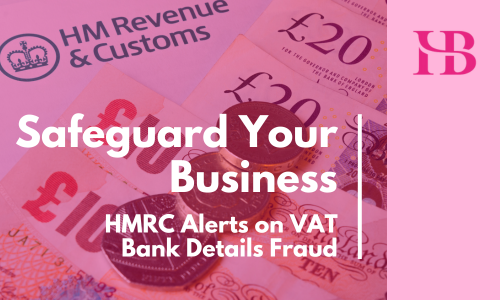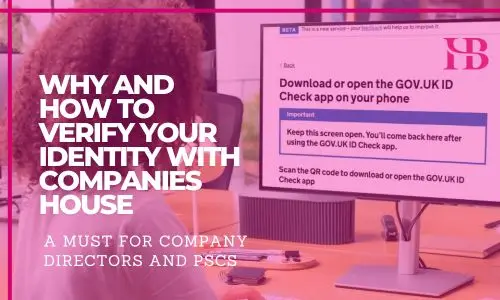In a recent development, HMRC has issued a critical warning regarding fraudulent activities targeting businesses’ VAT repayments. Exploiting Form VAT 484, fraudsters manipulate businesses’ contact, return, and bank details, posing a significant threat to financial security.

What is Form VAT 484?
Form VAT 484 is an online and paper document used by businesses to update their VAT details with HMRC. This includes information such as contact details, return dates, and bank details. It’s an essential form for ensuring accurate and up-to-date records with the HMRC.
What is VAT Bank Details Fraud?
HMRC has warned that the VAT 484 form has been used by fraudsters to gain access to businesses’ VAT repayments. HMRC are writing to businesses to confirm changes made to their details since January 2024. Do not ignore this communication from HMRC.
Safeguard My VAT Registered Business
Responding to HMRC’s alert, the ICAEW’s Tax Faculty has emphasised he urgency for businesses to take preventive measures.
- Conducting a thorough review of VAT details, particularly bank information in tax accounts
- Verify the receipt of expected repayments to thwart potential fraud attempts
- Do not ignore communication from HMRC regarding changes to VAT account
Who is at risk?
While repayment traders are primary targets, no business is immune. Fraud attempts are indiscriminate.
VAT registered businesses must be vigilant. By promptly verifying any VAT detail changes or unexpected repayment transactions, businesses can shield themselves from the threat of VAT bank details fraud. Take proactive steps today.
Do get in touch if you would like to discuss your accounting or tax needs – you can call us on 01992 444466 or email directors@hbaccountants.co.uk
The information contained above is for general guidance purposes only. Whilst every effort has been made to ensure the contents are accurate, please note that each individual has different circumstances and it is essential that you seek appropriate professional advice before you act on any of the information contained herein. HB Accountants can accept no liability for any errors
Read our Latest Posts Below
- HB Accountants Leads Installation of Life-Saving Defibrillator in Rye House, HoddesdonA potentially life-saving public access defibrillator has been installed in the Rye House area of Hoddesdon, made possible by local business HB Accountants, in partnership with local charity, Hearts for Herts, and a generous donation from Plumpton House landlord Clive Martin. HB Accountants’ fundraising had personal inspiration driving their mission.
- Cyberattacks – why FDs and CIOs need to collaborateThe growing threat of cyberattacks remains for all UK businesses. It could result in Cyber Vandalism – such as the publication of a fake terror attack at UK stations thanks to an admin error that impacted National Rail, fake voices and images – known as a deepfake attack – scammed the British design firm Arup … Continue reading
- Why and How to Verify Your Identity with Companies House – A Must for Company Directors and PSCsFrom 2024 onwards, Companies House has introduced important changes as part of the Economic Crime and Corporate Transparency Act. One of the biggest changes is the requirement for certain individuals to verify their identity to obtain a VIN number. This key step is to improve corporate transparency and tackle economic crime in the UK.
- HB Accountants Launches Inspiring Work Experience Initiative Across Borough of Broxbourne and We’re Just Getting Started!We’re thrilled to announce that the HB Accountants Work Experience Programme has officially launched giving local students the opportunity to rotate through five different businesses over their week experiencing the workplace.
- Hello from Livingstone! Talking to GertrudeSponsoring a university student in Zambia via the charity African Impact Foundation, has been an eye-opening experience for the HB team. Gertrude is studying for her Bachelor of Business Administration in Accounting and Finance at Chalimbana University in Zambia. She took time away from her studies to join a conference call with us and the … Continue reading






